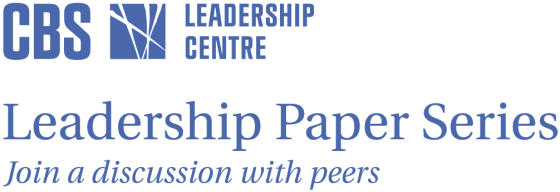
Loading
Monday 4. March 2024 at 10:30 to 12:00
Monday 4. March 2024 at 09:00
Howitzvej 60, 6th Floor, Room 601,
Howitzvej 60,
2000 Frederiksberg
Howitzvej 60, 6th Floor, Room 601
Howitzvej 60
2000 Frederiksberg

4th March 2024, at 10:30-12:00, Howitzvej 6th floor, Room 601.
PROGRAMME
|
10:30 - 10:35 |
Welcome! A brief introduction to the Leadership Centre and the Leadership Paper Series |
|
10:35 - 11:15 |
Paper 1: The Unseen Divide: Individual Adoption of Generative AI Tools in the Workplace Author: Christian Hendriksen, Department of Operations Management Discussant: Sverre Spoelstra, Department of Business Humanities and Law |
|
11:15 - 11:20 |
Break
|
|
11:20 - 12:00 |
Paper 2: Balancing digital person-branding in multi-stakeholder management processes
Authors: Anna-Bertha Heeris Christensen, Antonia Erz & Sylvia von Wallpach, Department of Marketing
Discussant: Fabian Csaba, Department of Management, Society and Communication |
|
12:00 - 13:00 |
Optional bring-your-own lunch |
PAPER 1
The Unseen Divide: Individual Adoption of Generative AI Tools in the Workplace
Christian Hendriksen.
In an era where generative AI is becoming a pivotal tool within the workplace, understanding its adoption and utilization across different organizational contexts is crucial. This paper presents a multiple case study of two distinct companies—one a large enterprise with over 1000 employees and the other a small business of around 20—to explore how employees integrate generative AI into their daily tasks. Contrary to the assumption that corporate policies, training, and infrastructural support would homogenize AI adoption rates and methods, our findings reveal significant individual differences in the adoption and utilization of AI technologies. These discrepancies are clear regardless of the organizational size or the resources available, underscoring a core challenge for leadership: effectively guiding AI adoption when employees individually discover and apply these technologies in diverse, innovative ways. This situation creates pronounced disparities in AI fluency and application across the workforce, posing both challenges and opportunities for organizational leadership. The paper raises questions about future leadership challenges as the individual adoption of AI increases and the potential capabilities of AI in the hands of employees expands.


|
Presenter: Christian Hendriksen, Departement of Operations Management
|
Discussant: Sverre Spoelstra, Departement of Business Humanities and Law |
PAPER 2
Balancing digital person-branding in multi-stakeholder management processes
Anna-Bertha Heeris Christensen, Antonia Erz & Sylvia von Wallpach.
This paper investigates the phenomenon of digital person-branding, focusing on influencer marketing as a case study to unravel the complexities faced by contemporary digital person-brands. Building upon Fournier and Eckhardt's (2019) seminal work on person-branding, which emphasizes the crucial balance between the individual and the brand for success (Fournier & Eckhardt, 2019), this study recognizes the uncertainty inherent in the human aspect within this discipline. Despite the significant insights provided by previous research on person-brand management, the advent of novel digital conditions has significantly altered the management processes involved in person-branding (Anderski et al., 2023; Delisle & Parmentier, 2016; Dumont & Ots, 2020; Eagar & Dann, 2016; Ramaswamy & Ozcan, 2016). In the present digital landscape, these processes involve a multitude of stakeholders, simultaneously working with various brands, and encompassing individuals who adopt multiple roles as person-brands (Anderski et al., 2023). While recent research has explored the multi-stakeholder dimension of digital person-branding, gaps still exist in understanding how this dynamic, influences the delicate equilibrium between the person and the brand, and how these two dimensions are effectively managed amidst different actors.
To address these gaps, our research endeavors to explore the management of digital person-branding among stakeholders and aims to elucidate the strategies employed to balance the person and the brand in the digital realm. Employing a multi-sited ethnographic method (Marcus, 1995), we conducted an investigation into sponsoring brands, media agencies, influencer agencies, and the influencers themselves. From an ecosystem perspective (Hillebrand et al., 2015), our findings reveal that digital person-branding is susceptible to imbalanced processes, originating from two primary foci that stakeholders exhibit in management processes, which we identify as the controlling and relating focus. These foci are observed to manifest in three distinct management practices enacted among stakeholders. For the controlling focus, we label these practices 1) Securing, 2) Freeing, and 3) Creating Shared Ownership. Meanwhile, the management practices associated with the relating focus are labeled 1) Fostering, 2) Nurturing, and 3) Aligning. In conclusion, we argue that achieving balance among multiple stakeholders in the digital person-branding process necessitates aligning commercial and personal interests. This alignment, we propose, should be strategically integrated into the various management practices employed in the process.


| Presenter: Anna-Bertha Heeris Christensen, Department of Marketing |
Discussant: Fabian Csaba, Departement of Management, Society and Communication |
ABOUT THE SERIES
The CBS Leadership Centre wants to bring together researchers across CBS to inspire and nurture cross-disciplinary thinking on leadership. The Leadership Paper Series are a forum for doing exactly this. We invite junior and senior colleagues, as well as visiting and guest scholars, to present and discuss leadership research in progress from a variety of disciplinary perspectives and theoretical traditions. Presenters will receive constructive feedback from discussants and attendees with the aim of developing their papers and arguments for eventual publication.
Papers will be sent out to registered attendees on 1st March. If you would like to receive a draft of the papers, or if you are interested to speak at one of our upcoming events, please e-mail Minna Paunova mp.msc@cbs.dk. Our next meeting will take place in May.
Click to view the event location on Google Maps >
Copenhagen Business School
Phone: +45 3815 3815
seminar.ioa@cbs.dk
Copenhagen Business School
Phone: +45 3815 3815
seminar.ioa@cbs.dk